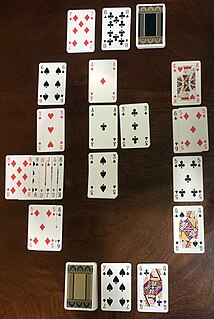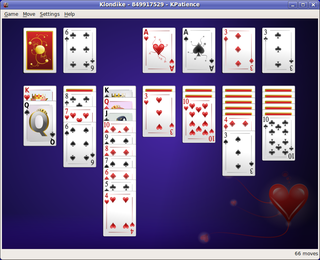
Pyramid is a patience or solitaire game where the object is to get all the cards from the pyramid to the foundation.

Clock Patience, also called Clock Solitaire, is a luck-based patience or solitaire card game with the cards laid out to represent the face of a clock. It is also known under alternative names such as Dial, Travelers, Hidden Cards, and Four of a Kind.

Russian Bank, Crapette or Tunj, historically also called Wrangle, is a card game for two players from the solitaire family. It is played with two decks of 52 standard playing cards. The U.S. Playing Card Company called it "probably the best game for two players ever invented".

Monte Carlo is a pair-matching patience card game where the object is to remove pairs from the tableau. Despite its name, it has no relation to the city with the same name nor to any casino-related game. Alternative names for this game include Good Neighbors and Weddings.
Gargantua is a patience or solitaire card game that is a version of Klondike using two decks. It is also known as Double Klondike and as Jumbo.

Grandfather's Clock is an easy patience or solitaire card game using a deck of 52 playing cards. Its foundation is akin to Clock Patience; but while winning the latter depends entirely on the luck of the draw, Grandfather's Clock has a strategic side, with the chances of winning being around 3 out of 4 games, especially if careful consideration is given to which cards would be released in instances where you have a choice of plays between identical cards.

Nestor is a patience or solitaire card game played with a single deck of standard playing cards. The object is the removal of pairs of cards with the same value from a layout of six rows of eight face-up cards and four additional face-up cards.
Decade or Ten-Twenty-Thirty is a Patience game played with a traditional 52-card deck. It is akin to another solitaire game called Accordion, but during game-play three adjacent cards totalling 10, 20, or 30 can be removed.
Cribbage solitaire is a solitaire card game using a deck of 52 playing cards. It is based on the game of five-card cribbage, also known as the "old game", and is one of many solitaire card games based on those played by at least two players, best known of which is poker solitaire.
Stonewall is a solitaire card game using a deck of 52 playing cards. It is probably thus named because the player seems to break down walls in exposing more of the face-down cards.

Baroness is a solitaire card game that is played with a deck of 52 playing cards. Also known as Five Piles, it is a game that has an arrangement that is almost like that of Aces Up but with an even lower win rate and lower skill factor, combined with the game play of Pyramid.
Rouge et Noir is a patience card game which is played using two decks of playing cards. Invented by Charles Jewell, it is a unique game where two types of building are done in the same game.
Mrs. Mop is a patience or solitaire card game which is played using two decks of playing cards. Invented by Charles Jewell, it is a relative of the solitaire game Spider in which all of the cards are dealt face up at the beginning of the game. The game seems easy at first, but when played, winning is difficult and it is rare to be able to complete the game successfully.
German Patience is a solitaire card game which is played with two decks of playing cards shuffled together. It is an unusual game because building in the tableau or playing area is up, as opposed to building down in many others. Despite its name, it is not known if this game originated from Germany.
Cribbage Square Solitaire is a solitaire card game based on cribbage which can be played using a deck of playing cards. This game works the same way as Poker Squares, but with cribbage scoring.
British Constitution is a solitaire card game played with two decks of playing cards. It is a card game with a high chance in winning.
Patriarchs is a solitaire card game which is played with two decks of playing cards. It is similar in reserve layout to Odd and Even but with different game play.
Jubilee is the name given to two solitaire card games, both played with two decks of playing cards. Both games are so-called because they were created during the time of the Golden Jubilee of Queen Victoria in 1887. One of the games has an ornate layout, while the other is simpler and it belongs to the family of games which include Sir Tommy, Strategy, and Calculation.

Patience (Europe), card solitaire or solitaire (US/Canada), is a genre of card games that can be played by a single player. Patience games can also be played in a head-to-head fashion with the winner selected by a scoring scheme.

Golf, also known as One Foundation, is a patience or solitaire card game where players try to earn the lowest number of points over the course of nine deals. It has a tableau of 35 face-up cards and a higher ratio of skill to luck than most other solitaire card games. Its easy game-play also makes it within easy reach of first-timers, while still offering scope for strategic play.










